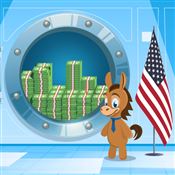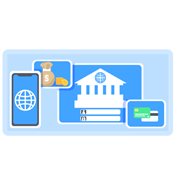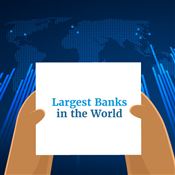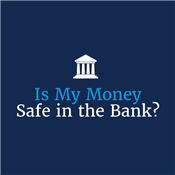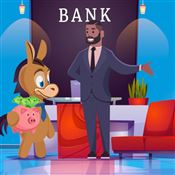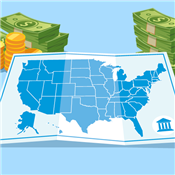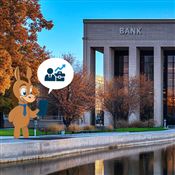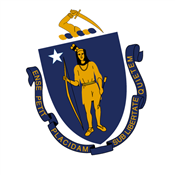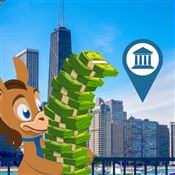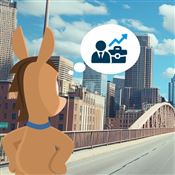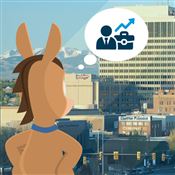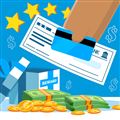Safest Banks in the US
Ad Disclosure: This article contains references to products from our partners. We may receive compensation if you apply or shop through links in our content. This compensation may impact how and where products appear on this site. You help support CreditDonkey by using our links.
When it comes to storing your money, you want the safest option. Keep reading to learn all about the safest banks in the U.S.
 |
Here are 11 banks you may not have to worry so much about:
- JPMorgan Chase (Current offer: $400 Bonus)
- U.S. Bank
- PNC Bank
- Citibank
- Wells Fargo (Current offer: $325 Bonus)
- Capital One
- M&T Bank Corporation
- AgriBank
- CoBank
- AgFirst
- Farm Credit Bank of Texas
When it comes to your money, the importance of safety and security can't be overstated.
And banks face a variety of threats today: hackers, ransomware, data leaks, and even bank failure.
So, where's the safest bank to keep your money? Dive into this guide and find out which banks are the safest in the U.S.
The FDIC reported a total of 566 bank failures between 2001 and 2024.[1]
Safest Savings Accounts to Store Your Money
Looking for a safe haven for your hard-earned money? Here are the best FDIC- or NCUA-insured savings accounts that also offer attractive returns.
PRO TIP: One of our top recommended choices CIT Bank earns 3.75% APY with a balance of $5,000 or more. You can open an account with just $100 and start earning interest right away. Find out more
CIT Bank Platinum Savings - 3.75% APY
- 3.75% APY with a balance of $5,000 or more
- 0.25% APY with a balance of less than $5,000
- $100 minimum opening deposit
- No monthly maintenance fee
- Member FDIC
UFB Portfolio Savings - Earn up to 3.26% APY
- Earn up to 3.26% APY.*
- No monthly maintenance fees.
- No minimum deposit required to open an account.
- Access your funds 24/7 with easy-to-use digital banking tools.
- Enjoy peace of mind with FDIC insurance up to the maximum allowance limit – Certificate #35546.
High-Yield Savings Premier - 3.80% APY
- No account fees
- Option to open individual or joint account
- FDIC insured up to $250,000 per depositor
- Only $500 minimum opening deposit
- Raisin:
High-Yield CD - Up to $1,500 Bonus - Consumers Credit Union:
7-Month Super Jumbo CD - 4.05% APY - Western Alliance Bank:
3-Month High-Yield CD - 4.00% APY - Bellco Credit Union:
6-Month CD - 3.90% APY - Quontic:
6 Month CD - 3.75% APY - CIT Bank:
6 Month CD - 3.75% APY
Are National Banks Safer?
With recent bank failures, you may wonder "are national banks safer than smaller, local banks?"
National banking titans, like Chase, do have certain advantages, such as:
- Robust security measures: National banks invest heavily in cutting-edge security to protect your funds and personal data against threats.
- Financial stability: Their vast assets and diverse portfolios help buffer against market swings.
- Federal oversight: National banks are subject to stringent regulations by federal agencies to guarantee compliance.
Plus, the largest national banks are often considered "too big to fail". This is the theory that they're so crucial to the economy that collapse would cause major disaster. So the government is likely to step in and support them to avoid failure.
In 2023, the U.S. banks considered "too big to fail" include Chase, Bank of America, Citigroup, and Wells Fargo.[2]
Explore a curated list of offers from top-tier banks. Find a solution that aligns with your safety and financial needs.
Safest Banks in the U.S.
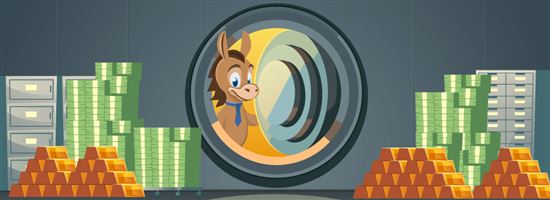 |
Below, review the safest banks in the U.S. Compare and explore the security features they employ to keep your money safe.
JPMorgan Chase
Chase
Pros:
| Cons:
|
Our Review: Chase has new customer bonuses and a strong nationwide presence. But there are drawbacks. Read this review to see if Chase is a good bank for you...
JPMorgan Chase, or simply known as Chase, is a bank with a very long history in business, founded over 225 years ago in September 1799.
Today, they have over 5,000 branches and more than 15,000 ATMs. It's the only brick-and-mortar bank with physical presence in all 48 contiguous states.
Chase is the largest of the "big four" banks in the U.S., with over $3.9 trillion in assets as of 2023.[3] It serves over 66 million American households and over 5 million small businesses.
FDIC Insured: Yes
| Security Features | Description |
|---|---|
| Account Alerts | Chase will send you transaction alerts to help you spot suspicious activity on your accounts. If they find you cannot be reached, they may put a temporary hold on your bank account. |
| Two-Factor Authentication | Prevents unwanted login to your accounts. They will employ extra precautions for unrecognized devices. |
| Controlled Access | Chase will require passwords whenever providing your banking information to third-party businesses. |
| Fraud Prevention Resources | Chase has support teams ready to help you in case you think you've been the victim of fraud. |
| Data Encryption | 128-bit encryption protects your banking data. |
Chase is known for its great checking options. It has accounts not offered by some other banks, like student checking and second chance checking. And they even offer bonuses for new customers.
U.S. Bank
U.S. Bank, also referred to as U.S. Bancorp, is a large financial institution based in Minneapolis, Minnesota, and currently stands as the fifth-largest banking institution in the U.S.
They have over 2,000 branches and operate 4,700+ U.S. Bank ATMs across the country, with $663.5 billion in total assets by the end of 2023.[4]
FDIC Insured: Yes
| Security Features | Description |
|---|---|
| Identity Authentication | U.S. Bank offers a range of methods for authenticating your identity, including one-time passcodes, biometrics, and visual patterns. |
| Fraud Prevention Resources | U.S. Bank knows that customers educated on the many ways they might be defrauded are less likely to fall victim to it. They provide a variety of useful resources to help customers practice safe banking habits. |
| Report Suspicious Activity | Customers can report suspicious activity on their accounts by phone or email. |
| Data Encryption | This prevents unwanted third parties from getting access to your information. |
PNC Bank
PNC Financial Services Group, Inc., a fairly large U.S. bank headquartered in Pittsburgh, PA, operates in 27 states + D.C. Like many of the banks listed here, PNC has quite a long history, dating back to 1852 when it was founded.
They offer attractive financial products, including a high yield savings account in select locations and a Virtual Wallet® combining checking and savings.
PNC has approximately 2,200 branches, 60,000 PNC and partner ATMs, and has $560 billion in assets.[5]
FDIC Insured: Yes
| Security Features | Description |
|---|---|
| Identity Authentication | PNC offers a range of methods for authenticating your identity, including two-factor authentication and security questions. |
| Fraud Prevention Resources | PNC Bank provide a variety of useful educational resources to help customers practice safe banking habits. |
| Report Suspicious Activity | Customers can report suspicious activity on their accounts by phone or email. |
| Data Encryption | This prevents unwanted third parties from getting access to your information. |
Citibank
Citibank is the consumer-facing side of the multinational investment bank and financial services corporation, Citigroup, which is another of the big four banks in the U.S.
Citibank is relatively new compared to some of the other banks on this list, only forming in 1998 after a merger between Citicorp and Travelers Group.
Citibank is based in Manhattan, NY, and has over 600 branches in the U.S., with more abroad, and in 2022, Citigroup Inc. had $2.4 trillion in total assets.[6]
FDIC Insured: Yes
| Security Features | Description |
|---|---|
| Account Alerts | Citibank will send you transaction alerts to help you spot suspicious activity on your accounts. |
| Liability Protection | Customers aren't liable for unauthorized transactions on their bank accounts. |
| Turn Your Card On/Off | In case your card is lost or stolen, you can turn off your card, and turn it on again if you recover it. |
| Two-Factor Authentication | Prevents unwanted login to your accounts. |
| Data Encryption | This prevents unwanted third parties from getting access to your information. |
Wells Fargo
Wells Fargo, founded nearly 100 years ago in 1929, is a multinational bank based in the U.S., with headquarters in San Francisco, CA, and Manhattan, NY.
They operate over 5,600 branches and 12,000 ATMs, and as of 2023 they had $1.9 trillion in assets.[7]
Wells Fargo is one of the "big four" banks in the U.S., which in 2018 held 45% of all consumer deposits.
FDIC Insured: Yes
| Security Features | Description |
|---|---|
| Account Alerts | Wells Fargo will send you transaction alerts to help you spot suspicious activity on your accounts. Includes purchases online, by phone, and by mail, ATM withdrawals or cash advances, and purchases over amounts you set. |
| Control Tower | Turn on and off cards and digital card numbers, view recurring payments, control third-party access to financial statements, all in one place. |
| Travel Plans | Notify your bank before traveling so they can monitor for suspicious activity. |
| Turn Your Card On/Off | In case your card is lost or stolen, you can turn off your card, and turn it on again if you recover it. The bank may still allow preset transactions. |
| Account Access Manager (Small Business) | Small business owners can add or revoke access to their business banking accounts. |
| Two-Factor Authentication | Prevents unwanted login to your accounts. |
| Biometric Sign On and Voice Verification | These help the bank confirm you are who you say you are. |
Capital One
Capital One is a newer bank that has grown immensely in the short time it's been around (it was founded in 1994). It's based in Richmond, VA, and in 2016, it came in fifth behind American Express, Chase, Bank of America, and Citigroup as largest issuers of credit cards.
Capital One operates over 280 branches and 70,000+ Capital One, Allpoint and MoneyPass ATMs across the U.S., and had $478.5 billion in assets as of 2023.[8]
FDIC Insured: Yes
| Security Features | Description |
|---|---|
| Account Alerts | Capital One will send you transaction alerts to help you spot suspicious activity on your accounts. You can set up instant purchase alerts to be notified whenever money is spent. |
| Account Monitoring | Capital One will automatically monitor your account for suspicious activity. |
| Turn Your Card On/Off | In case it's lost or stolen, you can lock your card. |
| Two-Factor Authentication | Prevents unwanted login to your accounts. |
| Data Encryption | This prevents unwanted third parties from getting access to your information. |
| Virtual Cards | Capital One customers can set up virtual cards for online shopping to avoid using their real card numbers. |
M&T Bank Corporation
Though M&T Bank Corporation is on the smaller end of the banks on this list, with only $205 billion in assets as of 2023.[9] However, it's had an impressive track record since its founding over 150 years ago in 1856.
In every quarter since 1976, this NY-based bank has been profitable, and was one of only two U.S. banks in the S&P 500 Index that didn't lower its dividend during the 2007-08 financial crisis.
Operating primarily in eastern states, M&T has over 1,000 branches.
FDIC Insured: Yes
| Security Features | Description |
|---|---|
| Account Alerts | M&T will send you transaction alerts to help you spot suspicious activity on your accounts. |
| Account Monitoring | M&T will automatically monitor your account for suspicious activity. |
| Security Questions | Customers can set up personalized security questions to protect access to their accounts. |
| Data Encryption | M&T employs 256-bit encryption to prevent unwanted third parties from getting access to your information. |
| Report Suspicious Activity | Customers can report suspicious activity on their accounts by phone. |
AgriBank
As a member of the U.S. Farm Credit System, AgriBank offers wholesale lending to local farm credit associations across 15 states.
It was formed after the merger between Farm Credit Bank of St. Louis and Farm Credit Bank of St. Paul in 1992.
They had over $170 billion in assets in 2023, and AgriBank was ranked number 42 on the list of safest banks from Global Finance in 2023.[10][11]
FDIC Insured: No. Members of the FCS are not insured by the FDIC.
| Security Features | Description |
|---|---|
| Biometric Login | Through facial recognition, you can prevent unwanted access to your account. |
| Two-Factor Authentication | Prevents unwanted login to your accounts. |
| Data Encryption | This prevents unwanted third parties from getting access to your information. |
CoBank
CoBank is an agricultural credit bank and a member of the U.S. Farm Credit System, and is based in Greenwood Village, Colorado.
Founded in 1989, this bank largely serves agricultural and farm-related businesses, cooperatives, and rural public utilities. They had $187.6 billion in assets as of 2023.[12]
CoBank was ranked number 51 on the list of safest banks from Global Finance in 2023.
FDIC Insured: No. Members of the FCS are not insured by the FDIC.
| Security Features | Description |
|---|---|
| Two-Factor Authentication | Prevents unwanted login to your accounts. They also have security questions. |
| Data Encryption | This prevents unwanted third parties from getting access to your information. |
| Positive Pay | Helps prevent the use of altered or counterfeit checks for those who receive them. |
| Educational Resources | CoBank provide a variety of useful educational resources to help customers practice safe banking habits. |
| Report Unauthorized Transactions | Customers are able to report any unauthorized transactions by phone. |
| Fraud Wise | This monthly audio show helps customers learn how to avoid fraud. |
AgFirst
AgFirst is another agriculturally focused bank, formed by the merger of the Farm Credit Bank of Baltimore and the Farm Credit Bank of Columbia in 1995.
It's a part of the U.S. Farm Credit System and is based in Columbia, South Carolina. They had $43.4 billion in assets in 2023,[13] and AgFirst was ranked number 54 on the list of safest banks from Global Finance in 2023.
FDIC Insured: No. Members of the FCS are not insured by the FDIC.
| Security Features | Description |
|---|---|
| Two-Factor Authentication | Prevents unwanted login to your accounts. They also have security questions. |
| Data Encryption | This prevents unwanted third parties from getting access to your information. |
| Security Training | AgFirst team members are provided with security awareness training. |
Farm Credit Bank of Texas
Farm Credit Bank of Texas is the fourth member of the U.S. Farm Credit System, providing wholesale lending and business services in states like Texas, Alabama, and New Mexico.
As of 2023, they had $36.8 billion in assets,[14] and Farm Credit Bank of Texas was ranked number 55 on the list of safest banks from Global Finance in 2023.
FDIC Insured: No. Members of the FCS are not insured by the FDIC.
| Security Features | Description |
|---|---|
| Data Encryption | This prevents unwanted third parties from getting access to your information. |
| Report Unauthorized Transactions | Customers are able to report any unauthorized transactions by email. |
How to Know if a Bank Is Safe?
Every financial institution is going to tell you it's safe. After all, their business depends on having your trust, whether they've earned it or not.
But with a little research, you'll be able to judge for yourself.
Here are some things to look for to help you determine whether they're a good place to keep your money.
- Size: Choosing a big national bank will almost always be safer than choosing a smaller one. Bigger banks, like Chase, have more resources, more sources of income, larger reserves, and more options to recover from a loss.
Most big banks are also older and have more experience in dealing with various challenges. And in the case of a financial crisis, since they serve more customers, they're probably more likely to receive government aid than smaller banks.
- FDIC insurance: A quick indicator that you're dealing with a legitimate bank. FDIC insurance protects the money you've deposited if something happens to the bank. For credit unions, this role is filled by NCUA insurance, rather than FDIC.
- Reviews: While it's not a guarantee of quality, you might take some time to see what other customers are saying about the bank before joining. Check out the Better Business Bureau, Trustpilot or similar sites to gauge the reception of the bank.
- Customer service: Look for banks that are easy to get ahold of at any time of day. Your finances don't operate on a schedule, and they shouldn't make you wait to deal with emergencies. Open lines of communication are a good sign that they're trying to provide good service and not just wring you for every dollar with minimum effort.
- The safest banks list from Global Finance: Global Finance has produced an annual list of the safest banks in the world for the past 30 years. Sadly, not many of them are from the U.S., and those that are don't exactly top the list.
- Digital security features: The safest banks will employ digital security features like multi-factor authentication, data encryption, timed logout, and fraud notifications. Other valuable security measures that banks can take include:
- Debit card blocking: This feature lets you remotely disable your debit card in case of fraudulent activity.
- Guarantee against unauthorized access: The bank agrees to reimburse you for any funds lost to fraudulent activity in your account.
- EMV chips: The little gold or silver chip you see on the face of most cards. This is safer than swiping, and your bank should offer them on their debit and credit cards.
- Single-use card numbers: When shopping online, a single-use card number can be the difference between having your info leaked in a future hack or not.
How Does FDIC Insurance Work?
The FDIC insures deposits of covered banks up to $250,000 per account holder, per ownership category.[15] It is backed by the full faith and credit of the federal government.
Here are some eligible bank accounts:
- Checking accounts
- Savings accounts/High-yield savings accounts
- Money market accounts
- Certificates of Deposit (CDs)
When FDIC-insured banks fail, the Federal Deposit Insurance Corporation steps in and takes over as the receiver of the failed bank's assets. They will use money from its insurance fund to pay back depositors, up to the maximum coverage limit.
For example, a married couple owns a joint savings account with $700,000 in it from a bank that just went under. Since there are 2 account holders who likely share 50-50 ownership, they can claim a total of $500,000 in insurance.
FDIC insurance does not apply to investment products, life insurance policies, U.S. Treasury and municipal securities, safe deposit boxes, and crypto assets. Losses due to theft, fraud, or other criminal activities are not covered either.
Is a Credit Union Safer than a Bank?
Credit unions may be perceived as a safer option than banks for several reasons. One is they are not for profit; instead, they are member-centric.
Even though credit unions can be just as vulnerable as banks, many bank failures have resulted from the pursuit of making money or profitability. Credit unions often have more conservative lending practices which reduce their exposure to financial crises.
Similar to federally insured banks, member share accounts are protected up to $250,000 per depositor with National Credit Union Administration (NCUA) coverage.[16]
According to Klaros Group's bank analysis for the first quarter of 2024, the industry remains under pressure dealing with the same problems that caused some banks to fail in recent years.[17] However, some banks are handling them well, while others are struggling more. The FDIC will continue to monitor risks from inflation, interest rate changes and geopolitical uncertainties.[18]
What the Experts Say
CreditDonkey asked a panel of industry experts to answer readers' most pressing questions. Here's what they said:
Bottom Line
Finding the right bank for you may seem like a challenging task, but armed with the right information, it doesn't have to be.
Depending on your banking needs, one or more of the banks on this list may be right for you. As some of the safest banks in the U.S., they'll take good care of your money while it's in their custody.
Wells Fargo Everyday Checking Account - $325 Bonus
- Get a $325 new checking customer bonus when you open an Everyday Checking account and receive $1,000 or more in qualifying direct deposits.
- Wells Fargo Bank, N.A.
Member FDIC
Chase Total Checking® - $400 Bonus
- New Chase checking customers can receive $400 when you open a Chase Total Checking® account and make direct deposits totaling $1,000 or more within 90 days of coupon enrollment.
- Unlock more offers with Chase. Get up to $500 per calendar year by referring friends and family. Plus, get cash back from top brands with Chase Offers when you use your debit card.
- Chase Total Checking® has a $15 monthly service fee, you can easily avoid the fee with direct deposits totaling $500 or more, or a minimum average daily balance each statement period.
- Chase Overdraft Assist℠ – no overdraft fees if you're overdrawn by $50 or less at the end of the business day or if you're overdrawn by more than $50 and bring your account balance to overdrawn by $50 or less at the end of the next business day*
- Chase Mobile® app makes banking simple. Manage accounts, pay bills, send money to friends with Zelle® and deposit checks on the go with Chase Quick Deposit℠.
- Chase has the largest branch network in the U.S. with thousands of ATMs and branches. Use the Chase locator tool to find a branch or ATM near you.
- Chase helps keep your money protected with features like Zero Liability Protection, fraud monitoring and card lock.
- Chase Total Checking includes FDIC insurance up to the maximum amount allowed by law.
U.S. Bank Business Essentials - $400 Bonus
Promo code Q1AFL26 MUST be used when opening a U.S. Bank Business Essentials® or Platinum Business Checking account. Limit of one bonus per business. A $100 minimum deposit is required to open one of the referenced accounts.
To earn a business checking bonus, open a qualifying U.S. Bank business checking account between 1/15/2026 and 3/31/2026. Make the required deposit(s) in new money within 30 days of account opening, maintain the same required daily balance through the 60th day, and complete 6 qualifying transactions based on posted date within 60 days of account opening.
Business Essentials: $400 bonus with $5,000 new money deposits, daily balance, and 6 qualifying transactions.
Qualifying transactions include debit card purchases, ACH and wire credits or debits, Zelle credits or debits, U.S. Bank Mobile Check Deposit, electronic or paper checks, Bill Pay (excluding payments made by credit card), and payment received via U.S. Bank Payment Solutions. Other transactions, such as person-to-person payments, credit card transfers, or transfers between U.S. Bank accounts, are not eligible.
New money is defined as funds from outside U.S. Bank and cannot be transferred from another U.S. Bank product or a U.S. Bank Affiliate. For accounts opened on non-business days, weekends or federal holidays, the open date is considered the next business day. Account fees may reduce the required daily balance during the qualifying period.
Bonus will be deposited into your new eligible U.S. Bank business checking account within 30 days after the month-end in which all offer requirements are met, provided the account remains open with a positive available balance.
Offer may not be combined with other business checking bonus offers. Existing businesses with a business checking account or had one closed within the past 12 months, do not qualify.
All regular account-opening procedures apply. For full checking account pricing, terms and policies, refer to your Business Pricing Information, Business Essentials Pricing Information, and YDAA disclosure. These documents are available at any U.S. Bank branch or by calling 800.872.2657.
Bonus will be reported as interest earned on IRS Form 1099-INT and recipient is responsible for any applicable taxes. Current U.S. Bank employees are not eligible. U.S. Bank reserves the right to withdraw this offer at any time without notice.
Member FDIC
References
- ^ Federal Deposit Insurance Corporation. Bank Failures in Brief - Summary, Retrieved 8/01/2024
- ^ Financial Stability Board. 2023 List of Global Systemically Important Banks, Retrieved 2/13/2024
- ^ JPMorgan Chase & Co. JPMorgan Chase Reports Fourth-Quarter and Full-Year 2023 Financial Results, Retrieved 2/13/2024
- ^ U.S. Bancorp. 4Q23 Earnings Conference Call, Retrieved 2/13/2024
- ^ PNC. PNC Corporate Profile, Retrieved 04/28/2025
- ^ Citigroup Inc. Quarterly Financial Data Supplement, Retrieved 2/13/2024
- ^ Wells Fargo. Reports Fourth Quarter 2023 Net Income of $3.4 billion, or $0.86 per Diluted Share, Retrieved 2/13/2024
- ^ Capital One Financial Corporation. Reports Fourth Quarter 2023 Net Income of $706 million, or $1.67 per share, Retrieved 2/13/2024
- ^ M&T Bank Corporation. Announces Fourth Quarter and Full-year 2023 Results, Retrieved 2/13/2024
- ^ AgriBank. September 2023 Quarterly Report, Retrieved 2/13/2024
- ^ GlobalFinance. World's Safest Banks 2023—Global Top 100, Retrieved 2/13/2024
- ^ CoBank. 2023 Quarterly Report, Retrieved 2/13/2024
- ^ AgFirst. 2023 Third Quarter Report, Retrieved 2/13/2024
- ^ Farm Credit Bank of Texas. Third Quarter Report 2023, Retrieved 2/13/2024
- ^ Federal Deposit Insurance Corporation. Understanding Deposit Insurance, Retrieved 8/01/2024
- ^ National Credit Union Administration. Share Insurance Coverage, Retrieved 8/01/2024
- ^ Klaros Group. Klaros Group State of the Banking Industry Report for Q1 2024, Retrieved 8/01/2024
- ^ Federal Deposit Insurance Corporation. Remarks by FDIC Chairman Martin Gruenberg on the Fourth Quarter 2023 Quarterly Banking Profile, Retrieved 8/01/2024
Jeremy Harshman is a creative assistant at CreditDonkey, a bank comparison and reviews website. Write to Jeremy Harshman at jeremy.harshman@creditdonkey.com. Follow us on Twitter and Facebook for our latest posts.
Note: This website is made possible through financial relationships with some of the products and services mentioned on this site. We may receive compensation if you shop through links in our content. You do not have to use our links, but you help support CreditDonkey if you do.
|
|
| ||||||
|
|
|








